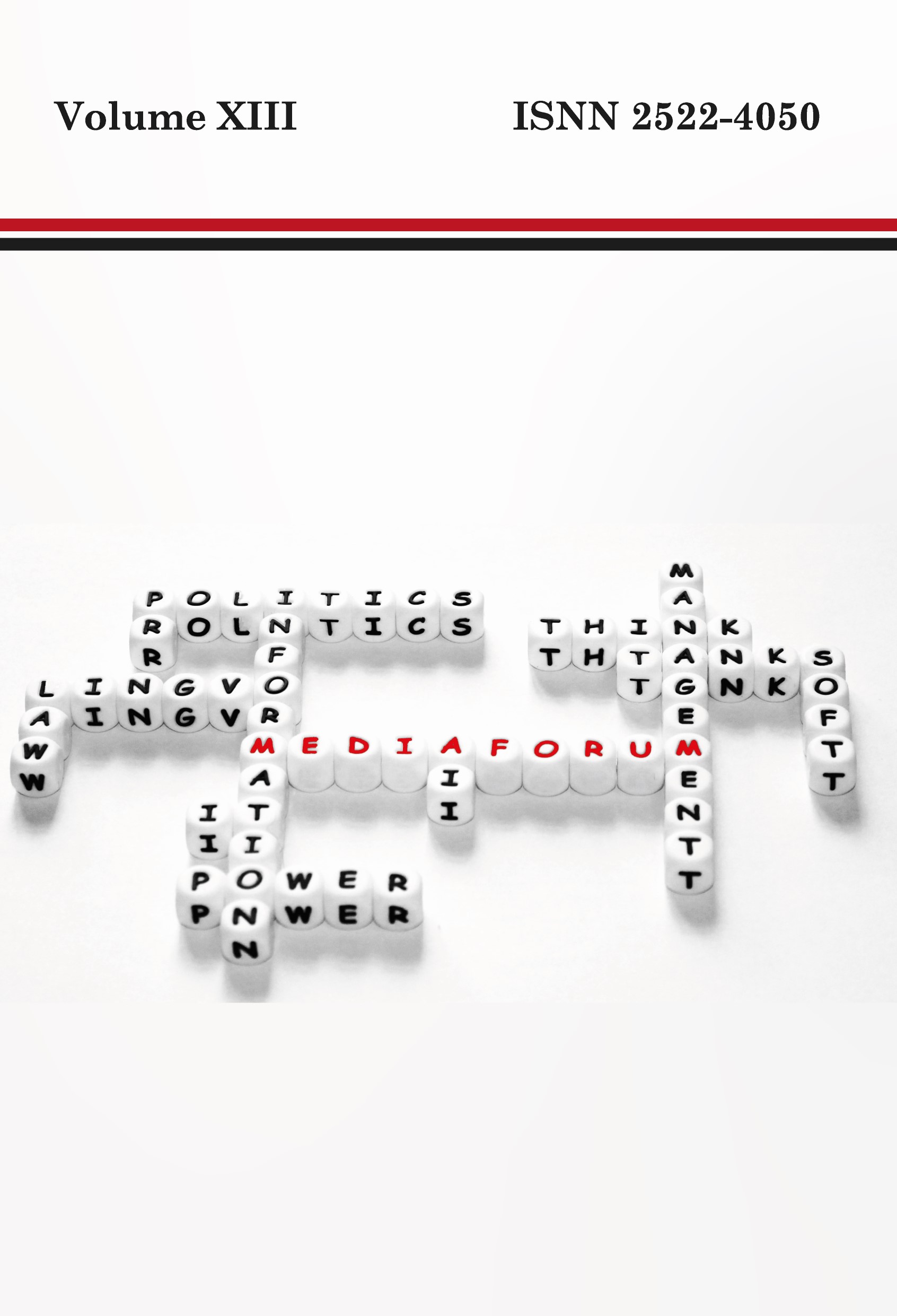Countering Disinformation on Social Media Platforms: Developments in the EU and Poland
DOI:
https://doi.org/10.31861/mediaforum.2023.13.143-160Keywords:
disinformation, freedom of expression, due diligence, social media platforms, Code of Practice on Disinformation, DSA, EU, PolandAbstract
One of the biggest challenges to European democracies is the spread of malicious disinformation, facilitated by the increasing importance of online platforms as news sources. The present article sheds light on the initiatives to combat disinformation on social media platforms in the EU. Some insights from Poland are also drawn.
The research reveals that the EU’s anti-disinformation activities can be traced back to 2015, which marked the establishment of the East StratCom Task Force, disinformation monitoring project EUvsDisinfo, and Hybrid Fusion Cell. Building on these initiatives, the EU prompted the development of a groundbreaking self-regulatory Code of Practice on Disinformation, followed up and complemented by the legally binding DSA. Both documents provide due diligence standards and promote best practices for combating disinformation on platforms.
With regard to the developments in Poland, notwithstanding some legislative proposals the country lacks comprehensive national policies to address platform disinformation. It persists as a critical concern, exacerbated by the rule of law challenges since 2015.
The article recommends complementing well-elaborated legal frameworks with media literacy initiatives, civil society engagement, and technological innovations to detect and counter disinformation more efficiently. Such a holistic approach can enhance society’s resilience against disinformation while upholding democratic principles and freedom of expression in the digital age.
Downloads
References
Appelman, Naomi, Stephan Dreyer, Pranav Manjesh Bidare, Keno C. Potthast. 2022. “Truth, intention and harm: Conceptual challenges for disinformation-targeted governance”. Internet Policy Review. https://policyreview.info/articles/news/truth-intention-and-harm-conceptual-challenges-disinformation-targeted-governance/1668
Commission on Security and Cooperation in Europe. 2017. “The Scourge of Russian Disinformation”. https://www.csce.gov/hearings/scourge-russian-disinformation/
EU Code of Practice on Disinformation. 2018. https://digital-strategy.ec.europa.eu/en/library/2018-code-practice-disinformation
European Commission and High Representative. 2016. Joint Framework on countering hybrid threats - a European Union response. April 6. https://eur-lex.europa.eu/legal-content/EN/TXT/?uri=CELEX%3A52016JC0018
European Commission and High Representative. 2018. Action Plan on disinformation. December 5. https://commission.europa.eu/document/download/b654235c-f5f1-452d-8a8c-367e603af841_en?filename=eu-communication-disinformation-euco-05122018_en.pdf
European Commission. 2018. Tackling online disinformation: a European Approach. April 26. https://eur-lex.europa.eu/legal-content/EN/TXT/?uri=CELEX:52018DC0236
European Commission. 2019. “A Europe that protects: good progress on tackling hybrid threats”. Press corner. https://ec.europa.eu/commission/presscorner/detail/en/IP_19_2788
European Commission. 2020a. First baseline reports – Fighting COVID-19 disinformation Monitoring Programme. September, 10. https://digital-strategy.ec.europa.eu/en/library/first-baseline-reports-fighting-covid-19-disinformation-monitoring-programme
European Commission. 2020b. Assessment of the Code of Practice on Disinformation – Achievements and areas for further improvement. September, 10. https://digital-strategy.ec.europa.eu/en/library/assessment-code-practice-disinformation-achievements-and-areas-further-improvement
European Commission. 2020c. On the European democracy action plan. December 3. https://eur-lex.europa.eu/legal-content/EN/ALL/?uri=CELEX%3A52020DC0790
European Commission. 2021. Guidance on Strengthening the Code of Practice on Disinformation. May 26. https://digital-strategy.ec.europa.eu/en/library/guidance-strengthening-code-practice-disinformation
European Commission. 2022. “The 2022 Code of Practice on Disinformation”. Policies. https://digital-strategy.ec.europa.eu/en/policies/code-practice-disinformation
European Commission. 2023. “Digital Services Act: Commission designates first set of Very Large Online Platforms and Search Engines”. Press corner. https://ec.europa.eu/commission/presscorner/detail/en/ip_23_2413
European Council. 2015. European Council meeting – Conclusions. March 19-20. https://www.consilium.europa.eu/media/21888/european-council-conclusions-19-20-march-2015-en.pdf
European Digital Media Observatory. 2020. “Implementation of the Code of practice on disinformation: lessons from the assessments and proposals for the future”. https://edmo.eu/wp-content/uploads/2021/02/EDMO_CoP_workshop281020_report-003.pdf
European External Action Service. 2021. “Questions and Answers about the East StratCom Task Force”. https://www.eeas.europa.eu/eeas/questions-and-answers-about-east-stratcom-task-force_en
European Parliament and Council of the EU. 2022. Regulation (EU) 2022/2065 of the European Parliament and of the Council of 19 October 2022 on a Single Market For Digital Services and amending Directive 2000/31/EC (Digital Services Act). October 19. https://eur-lex.europa.eu/eli/reg/2022/2065/oj
EUvsDisinfo. n.d. a. “About”. Accessed January 12, 2024. https://euvsdisinfo.eu/about/
EUvsDisinfo. n.d. b. “Ukraine”. Accessed January 10, 2024. https://euvsdisinfo.eu/ukraine/
Fahy, Ronan, Naomi Appelman, and Natali Helberger. 2022. “The EU’s regulatory push against disinformation: What happens if platforms refuse to cooperate?” VerfBlog. https://verfassungsblog.de/voluntary-disinfo/
High level Group on fake news and online disinformation. 2018. “A multi-dimensional approach to disinformation”. Publications Office of the EU. https://op.europa.eu/en/publication-detail/-/publication/6ef4df8b-4cea-11e8-be1d-01aa75ed71a1/language-en
Konarski, Xawery. 2022. “Dezinformacja online – jak ją rozumieć i jakie są środki prawne jej zwalczania w Polsce i UE”. https://www.traple.pl/dezinformacja-online-jak-ja-rozumiec-i-jakie-sa-srodki-prawne-jej-zwalczania-w-polsce-i-ue/
Legucka, Agnieszka. 2019. “Countering Russian Disinformation in the European Union”. Polish Institute of International Affairs. https://pism.pl/publications/Countering_Russian_Disinformation_in_the_European_Union
Maelen, Carl Vander, and Rachel Griffin. 2023. “Twitter’s retreat from the Code of Practice on Disinformation raises a crucial question: are DSA codes of conduct really voluntary?” DSA Observatory. https://dsa-observatory.eu/2023/06/12/
twitters-retreat-from-the-code-of-practice-on-disinformation-raises-a-crucial-question-are-dsa-codes-of-conduct-really-voluntary/
Media Freedom Rapid Response. 2023. “Report: Media freedom at a crossroads – Journalism in Poland faces uncertain future ahead of election”. International Press Institute. https://ipi.media/report-media-freedom-at-a-crossroads-journalism-in-poland-faces-uncertain-future-ahead-of-election/
Minister Sprawiedliwości. 2021. Projekt ustawy o ochronie wolności słowa w internetowych serwisach społecznościowych, draft no. UD293. September 29. https://legislacja.rcl.gov.pl/projekt/12351757/katalog/12819467#12819467
Peukert, Alexander. 2023. “The Regulation of Disinformation in the EU – Overview and Open Questions”. Research Paper of the Faculty of Law of Goethe University Frankfurt/M. No. 2/2023. https://ssrn.com/abstract=4496691
The Strengthened Code of Practice on Disinformation. 2022. https://digital-strategy.ec.europa.eu/en/library/2022-strengthened-code-practice-disinformation
Wójcik, Anna. 2023. “Restoring Poland’s Media Freedom”. VerfBlog. https://verfassungsblog.de/restoring-polands-media-freedom/
Zadroga, Mateusz, and Magdalena Wilczyńska. 2023. “Disinformation landscape in Poland”. EUvsDisinfo. https://www.disinfo.eu/wp-content/uploads/2023/12/20231203_PL_DisinfoFS.pdf














